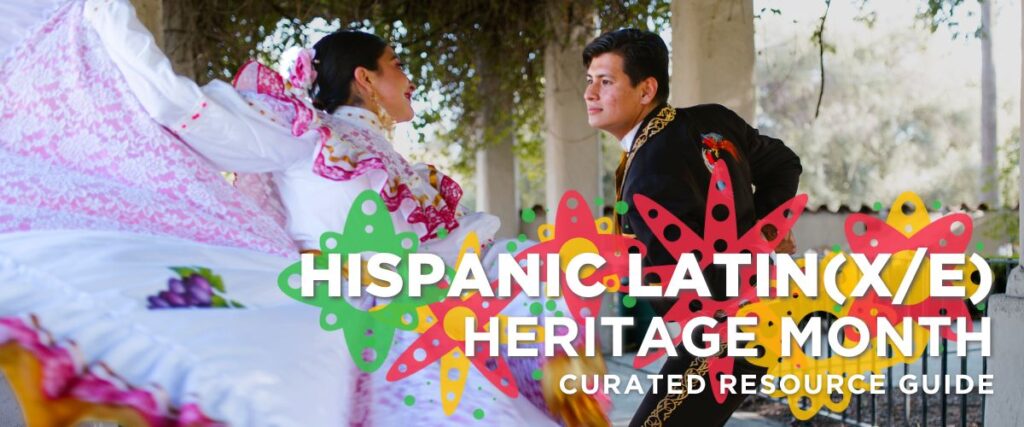Hispanic Latin(x/e) Heritage Month (HLHM), also known as National Hispanic Heritage Month, is observed from September 15 through October 15 each year. This month celebrates the histories, cultures, and contributions of Americans with ties to Spain, Mexico, the Caribbean, and Central/South America. Started as Hispanic Heritage Week in 1968 by President Lyndon Johnson, President Ronald Reagan expanded the observance to a 30-day period in 1988.
Significantly, some independence day celebrations fall within this 30-day window: Costa Rica (September 15); El Salvador (September 15); Guatemala (September 15); Honduras (September 15); Nicaragua (September 15); Mexico (September 16); and Chile (September 18).
To recognize and celebrate this month, CEHHS created a curated list of resources centering Hispanic Latin(x/e) voices and stories. We organized these resources into several categories to focus on the unique experiences of the broad community. These resources are available through the UT Library and online.
- Anything for Selena | Podcast
- Black Dove: Mamá, Mi’jo, and Me by Ana Castillo | Memoir
- Fiebre Tropical by Julián Delgado Lopera | Physical Book
- Latino Americans | Documentary
- Why Do We Celebrate Hispanic Heritage Month? | Video
2022 Highlighted Resources
- La Brega | Podcast
- The Hacienda by Isabel Cañas | Physical Book
- ¡Pleibol! In the Barrios and the Big Leagues | Virtual Exhibit
- ¡Presente! A Latino History of the United States | Virtual Exhibit
- Selena | Movie
Hispanic, Latin(o/a), or Latin(x/e)?
Hispanic, Latin(o/a), and Latin(x/e) all refer to the ethnicity and culture of people celebrated during HLHM. Each holds a distinct significance and unique meaning.
Hispanic typically refers to a person who descended from a Spanish-speaking population or speaks Spanish. This identity centers the language identity rather than geographical location.
Latin(o/a) instead refers to geographical culture, describing individuals who are from or descended from people living in Latin America.
Latin(x/e) became an alternative form of Latin(o/a) to be more inclusive and gender-neutral. While Latinx became popular in the 2010s, Latine aligns better with the grammatical format of Spanish, and many Spanish speakers use this term.
Individuals can identify as either, neither, or all of these identities. For example, Chicano (descendants of people from Mexico) could identify with all terms or none based on their cultural experience. Additionally, these terms do not assume race, as these ethnic identifies are inclusive of various racial groups such as Afro-Latines.
- About One-in-Four U.S. Hispanics Have Heard of Latinx, but Just 3% Use It | Article
- On The Census, Who Checks ‘Hispanic,’ Who Checks ‘White,’ And Why | Article
- Latinidad in the US, Latinx, Latina/o, or Hispanic?: Geographies of Oppression, Race, Gender, and Language | Blog Post
- This Comic Breaks Down Latinx vs. Latine for Those Who Want to Be Gender-Inclusive | Article
- The Differences Between the Terms Hispanic, Latino, and Latinx, Explained | Article
- What Is the Difference Between Hispanic and Latino? | Article
Hispanic Latin(x/e) Voices
The below resources highlight some of the voices in the Hispanic Latin(x/e) community through different media formats.
Afro-Latin@s in Movement: Critical Approaches to Blackness and Transnationalism in the Americas | Physical Book
An African American and Latinx History of the United States | Physical Book
Latinx: The New Force in American Politics and Culture | Physical Book
Making Hispanics : How Activists, Bureaucrats, and Media Constructed a New American | Physical Book
Retablos: Stories from a Life Lived Along the Border | Physical Book
The Latino/A American Dream | Physical Book
Universal citizenship: Latina/o Studies at the Limits of Identity | E-Book
Borderlands/La Frontera: The New Mestiza | Essays
Her Body and Other Parties | Short Stories/Essay
Sabrina & Corina | Short Stories
Unaccompanied | Poetry
When I Was Puerto Rican | Memoir
Coco | Movie
Craft in America: Borders | Documentary
For Daca Students, It’s Hard To Focus On A Bright Future When Faced With Deportation Fears | Video
Frida | Movie
Maria Full of Grace | Movie
Spanish Voices: Spanish and English in the Southeastern United States | Documentary
Cerámica de los Ancestros – Central America’s Past Revealed | Virtual Exhibition
Library of Congress – Latinx and Chicanx in STEM | Research Guide
Library of Congress – Latinx Resource Guide: Civil Rights | Research Guide
Library of Congress – The PALABRA Archive | Research Guide
Our Journeys Our Stories: Portraits of Latino Achievement | Nuestros Caminos Nuestras Historias: Retratos del Logro Latino | Virtual Exhibition
Casa de los espíritus by Isabel Allende
Clap When You Land by Elizabeth Acevedo
Dominicana by Angie Cruz
In the Time of Butterflies by Julia Alvarez
Mexican Gothic by Silvia Moreno-Garcia
Curated September 2021 by Miranda N. Rutan, Doctoral Student, CEHHS DEI, UT Knoxville | Updated September 2023 by Miranda N. Rutan, Doctoral Student, CEHHS DEI, UT Knoxville
